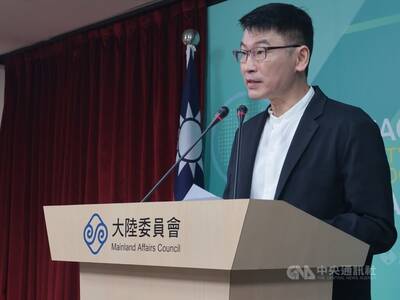A casual chat and the application of crossover technology were the seeds that grew into a career for Li Wan-ju (李萬柱), culminating in the discovery of a way to create artificial cartilage, a technique that promises to help millions of patients around the world who suffer from damaged joints.
Currently, for those who have serious joint damage caused by arthritis or injury, physiotherapy or artificial joint replacement are the only options, with replacement surgery being expensive and painful.
However, a "nanofiber scaffold" developed by Li and his colleagues at the National Institute of Health in Bethesda, Maryland has succeeded in generating cartilage that offers a new option for patients.
The story began in 1997, when Taiwan-born Li was studying for his master's degree at the Biomedical Engineering Graduate School at Drexel University in Philadelphia.
The graduate from Taiwan's Chung Yuan University in Chungli was told by a teacher that the potential use of a largely ignored patent from 1938 had not been fully explored.
The patent concerned the generation of fine fibers that are produced from a solution of gel-like particles when heavy electrical voltage is applied.
The teacher said the spinning applied to the technique, which produces fibers with diameters measured in nanometers, had been widely used in textile manufacture, particularly in screen-making, but had not been studied for its possible use in medicine, although the fibers the process produces look like collagen fibrils -- analogous to the structures that support cells that produce bone and cartilage.
Li's interest was piqued and he assembled his own equipment with components he bought at a local hardware store and began to electrospin fibers that lasted longer than those in previous experiments.
Lee said that until 1998 his preliminary work focused on trying to control the diameter of the fibers he spun. Then he formed fibers with diameters of between 300 nanometers and 500 nanometers and began using them to fabricate scaffolds on which to grow human cells.
His study was presented at the Sixth Annual World BioMaterials Conference in Kamuela, Hawaii in 2000, and has been cited more than 180 times by scientists around the world since it was published in a periodical in 2002.
After entering the doctorate program at Thomas Jefferson University in Philadelphia, Li began to study the ways that cells implanted on electrospun nanofiber scaffolds grow.
His study continued when he joined the National Institute of Health. He and his colleagues at the center's Cartilage Biology and Orthopedics Branch immersed human mesenchymal stem cells in an electrospun polymer scaffold and induced cells to grow.
Stem cells, derived from the spinal cord, were chosen for the experiment because they can differentiate into a variety of specialized cell types, such as adipose, cartilage and bone cells.
The scaffold is effective because its 700-nanometer diameter fibers imitate the collagen fibrils that support cells in the body. The fine fibers also degrade at an acceptably slow rate. They dissolve slowly enough to give the cells time to secrete collagen which replaces the scaffold.
The difficulty is in balancing the pace that the scaffold degrades with the pace the collagen is produced by the cells. Li and the other team members had preliminary success in testing the tissue-engineered constructs in vivo.
In 2002, Li cooperated with a surgeon at National Taiwan University Hospital in Taipei and cartilage Li produced on the polymer nanofiber scaffold was implanted into the foot of a pig.
Six months after the operation, they cut into the pig's foot and found that the graft had grown as if it were a part of the pig foot, with no rejection at all.
The success of the experiment suggested that patients whose joints are worn out because of age might be treated with artificial cartilage implants rather than having artificial replacements.
Creating cartilage for human beings in the laboratory is still some years down the road, but Li believes this day will come, and even more applications for the technology will be discovered over time.

The Japan-Taiwan Exchange Association has cautioned Japanese travelers to be vigilant against pickpockets at several popular tourist spots in Taiwan, including Taipei’s night markets, the Yongkang Street area, Zhongshan MRT Station, and Jiufen (九份) in New Taipei City. The advisory, titled “Recent Development of Concerns,” was posted on the association’s Web site under its safety and emergency report section. It urges travelers to keep backpacks fully zipped and carried in front, with valuables placed at the bottom of the bag. Visitors are advised to be especially mindful of their belongings when taking photos or speaking on the phone, avoid storing wallets and

ENDORSING TAIWAN: Honduran presidential candidate Nasry Afura said that Honduras was ‘100 times better off’ when it was allied with Taipei The Ministry of Foreign Affairs yesterday said it would explore the possibility of restoring diplomatic relations with Honduras based on the principle of maintaining national interests and dignity. The ministry made the remarks in response to reporters’ questions regarding an article titled: “Will Taiwan Regain a Diplomatic Ally?” published in The Diplomat on Saturday. The article said Honduras’ presidential election in November could offer Taiwan the chance to regain an ally, as multiple candidates have promoted re-establishing diplomatic relations with Taiwan. Honduras severed diplomatic ties with Taiwan in March 2023 in favor of Beijing, but since switching its diplomatic recognition,

Scoot announced yesterday that starting in October, it would increase flights between Taipei and Japan’s Narita airport and Hokkaido, and between Singapore and Taipei. The low-cost airline, a subsidiary of Singapore Airlines, also said it would launch flights to Chiang Rai in Thailand, Okinawa and Tokyo’s Haneda airport between December and March next year. Flights between Singapore and Chiang Rai would begin on Jan. 1, with five flights per week operated by an Embraer E190-E2 aircraft, Scoot said. Flights between Singapore and Okinawa would begin on Dec. 15, with three flights per week operated by Airbus A320 aircraft, the airline said. Services between Singapore

The Mainland Affairs Council (MAC) yesterday announced a ban on all current and former government officials from traveling to China to attend a military parade on Sept. 3, which Beijing is to hold to mark the 80th anniversary of the end of the Second Sino-Japanese War. "This year marks the 80th anniversary of the end of World War II and the Republic of China’s victory in the War of Resistance [Against Japan]," MAC Deputy Minister and spokesperson Liang Wen-chieh (梁文傑) told a regular news briefing in Taipei. To prevent Beijing from using the Sept. 3 military parade and related events for "united